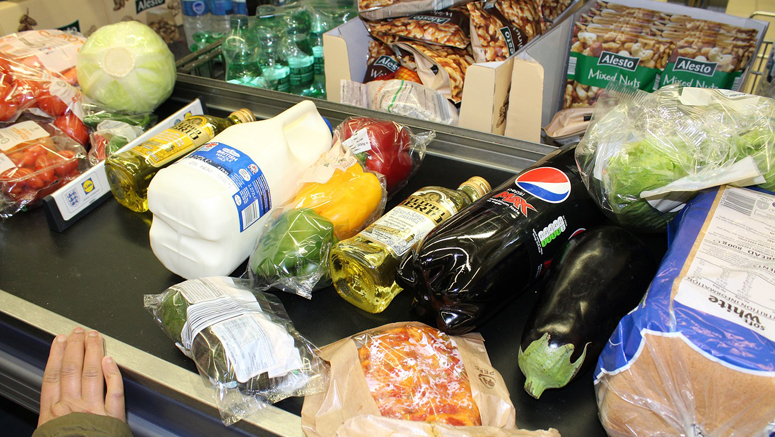HARTFORD, Conn. (AP) — The Connecticut agriculture commissioner is considering buying food in bulk to provide to organizations that feed needy people, which have seen huge upticks in demand coupled with challenges in getting supplies, he said Monday.
Having the state or another entity do so on behalf of charitable food banks and pantries might help make more food available, said Commissioner Bryan Hulburt, whose agency was recently tasked with overseeing food insecurity issues amid the COVID-19 pandemic.
“Just like we saw with the PPE, each organization is trying to outbid the other for additional food, and that can’t the solution as this turns into a long-term challenge that we have to respond to,” Hurlburt said at a virtual roundtable with U.S. Sen. Richard Blumenthal, a Democrat, and the organization End Hunger CT.
Hurlburt said his agency has already reached agreements with state colleges and universities to use their refrigerators to store bulk purchases of food.
Representatives of various food pantries reported huge demands for assistance since the coronavirus has struck the state.
Deidre DiCara, executive director of the FISH Food Pantry in Torrington, said in the online chat that some grocery stores have ceased distributing food and that she is working with a local restaurant owner’s distributor to obtain meat, something the pantry has been unable to offer for a week.
That costs more, though, she said.
Various efforts are underway to make more food available to needy families in Connecticut. Hurlburt said more than 35 mobile EBT readers for food stamp recipients are being distributed to farm stands and farmers markets, due to grant funding received by the Department of Social Services.
That, he said, will double the current number of EBT readers at those locations.
The deaths of nearly 2,500 Connecticut residents have been linked to COVID-19, the disease caused by the virus. More than 29,000 state residents have tested positive. As of Sunday, hospitalizations had declined for 11 consecutive days, to over 1,480.
For most people, the coronavirus causes mild or moderate symptoms, such as fever and cough, that clear up in two to three weeks. For some, especially older adults and people with existing health problems, it can cause more severe illness, including pneumonia, and death.
In other developments related to the coronavirus:
___
POWER PLANT WORKERS
Workers at Connecticut’s only nuclear power plant worry that managers are not taking enough precautions against the coronavirus after 750 temporary employees were brought in to help refuel one of the two active reactors.
Ten employees at the Millstone Power Station in Waterford have tested positive for the virus, and the arrival of the temporary workers alarms some of the permanent employees, The Day newspaper reported Sunday.
“Speaking specifically for the guard force, there’s a lot of frustration, there’s a lot of concern, and I would say there’s anger,” said Millstone security officer Jim Foley.
Foley, vice president of the local chapter of the United Government Security Officers of America, said security personnel have had to fight for personal protective equipment and for partitions at access points to separate staff from security.
Foley also has filed a complaint with the Occupational Safety and Health Administration saying Millstone staff are using ineffective cleaning materials and citing a lack of cleaning and sanitizing. Cleaning activity was not scheduled during three weekends in April, he said.
Officials at Millstone, owned by Dominion Energy, have not heard internal criticism about the plant’s virus precautions, Millstone spokesman Kenneth Holt said.
“We’ve actually gotten a lot of compliments from employees on the steps we’ve taken,” he said. “We’ve stepped up communications with employees to let them know what’s going on.”
Millstone recently increased cleaning staff on the weekends, Holt said, and there is regular disinfecting at the plant.
___
SAFE VOTING
Secretary of the State Denise Merrill released a plan Monday aimed at making voting safe during the Aug. 11 primary and Nov. 3 general election.
Merrill said her office is requiring all cities and towns in the state to submit plans for the two elections that include a list of cleaning and safety products to be used, a list of polling locations, staffing levels at each polling location, and the names of polling workers and moderators.
Municipalities will be eligible for grants to cover the extra costs of holding elections during a pandemic, including expenses for cleaning products and increased staffing.
Merrill also announced her office and the Connecticut National Guard will perform a high-level cybersecurity assessment of the election infrastructure of all 169 towns in the state to guard against malicious actors.
Merrill’s office also will provide network upgrades to the election infrastructures of 20 towns that have had chronic problems with connecting to the elections system.
(Copyright (c) 2024 The Associated Press. All Rights Reserved. This material may not be published, broadcast, rewritten, or redistributed.)

